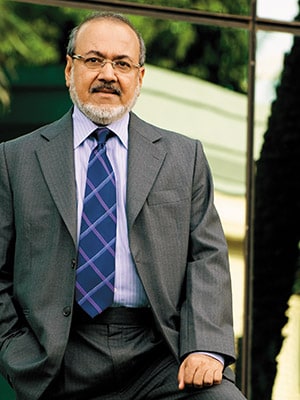
Biggest Gainers and Losers on India Rich List 2013
Ups and downs are part and parcel of wealth creation. This list reflects just that. Here are the biggest gainers and losers over the last year, ranked in terms of percentage change in net worth
The Biggest Gainers
BR Shetty
New Medical Centre Group, UAE
+ $340 mln (+63%)
(Rank 72; moved 25 places)
The founder of NMC Healthcare is among the more low-profile names on the Rich List, but he is also our biggest gainer this year. The 71-year-old from Udupi, who made his fortune in Abu Dhabi in the health care and money transfer business, listed his company on the London Stock Exchange in 2012. As sales grew, the stock price climbed and, with it, his net worth.
Shiv Nadar, HCL Tech
+ $3 bln (+54%)
(Rank 7; moved 6 places)
Shiv Nadar’s wealth is tied mainly to the value of HCL Technologies, the IT services company he founded in 1991. Long tagged as the dark horse among the top five in the sector, HCL Tech has surprised the market by being able to grow margins as well as cut costs. Stock price over the past one year grew 80 percent aided by a devalued rupee and higher earnings. Pursuing infrastructure management deals that come up for renewals at a lower price has proved to be an effective strategy.
Dilip Shanghvi, Sun Pharma
+ $4.7 bln (+51%)
(Rank 3; moved 2 places)
Dilip Shanghvi becomes India’s third richest man on the back of a huge jump in the Sun Pharmaceuticals stock price, which shot up by 58 percent outperforming the Sensex. Apart from overall growth, the stock was boosted by the blockbuster sales of generics cancer drug Doxorubicin, whose innovator Janssen Pharmaceuticals admitted to its short supply and, instead, directed buyers to Sun.
Vikram Lal, Eicher Motors
+ $310 mln (+49%)
(Rank 67; moved 24 places)
Vikram Lal’s rise has been led by Eicher’s incredible run on the bourses in the past year. The stock jumped from Rs 2,280.05 in October, 2012, on the BSE to Rs 4,040 in October, 2013. The growth can, in part, be attributed to the two-wheeler business. Royal Enfield’s sales grew by 52 percent, even though commercial vehicle sales remained flat. If he continues at this rate, Lal is set to join the billionaires list next year.
Desh Bandhu Gupta, Lupin
+$850 mln (+36%)
(Rank 19; moved 8 places)
A strategic call to move to chronic diseases like diabetes, asthma and central nervous system disorders have boosted Lupin’s growth over the past three years. DB Gupta has been able to make steady inroads into the US and Japanese markets with a steady pipeline of products. Revenue from Japan, in 2013, jumped 52 percent over the previous year. Shares of the company are up by 60 percent in the last year on rising profits.
The Biggest Losers
Habil Khorakiwala, Wockhardt
-$1.09 bln (-61%)
(Rank 89; moved 56 places)
The biggest gainer from last year is, this time, the biggest loser. Share prices of Wockhardt have crashed after the drug maker received warning letters from the American drug regulator, FDA. From an all-time high of Rs 2,166 in March, 2013, on the BSE, the stock fell to Rs 460 in October, 2013. Investors believe FDA warnings will slow its production and hamper its chances of getting a slice of the nearly $100-billion market when drugs go off patent.
Vikas Oberoi, Oberoi Realty
-$570 mln (-42%)
(Rank 79; moved 33 places)
A dull property market has knocked Vikas Oberoi off his perch on India’s billionaire’s row. Oberoi Realty continues to be cash-rich, compared to other real estate peers that are floundering under debt. Yet, the slowdown in Mumbai’s real estate market has hit the company hard. Expansion to Delhi and Bangalore through joint ventures, though still on the cards, is likely to be tougher.
Savitri Jindal, Jindal group
-$3.3 bln (-40%)
(Rank 14; moved 7 places)
India’s richest woman saw her wealth eroded severely, mainly by falling demand for metal and a ban on iron ore mining in several states. Three of the four group companies, each headed by her sons, saw their share prices fall to almost half their year-ago levels. Even without the economic slowdown, it has been a challenging time for the Jindal brothers; the youngest, Naveen, is also fighting allegations of regulatory violations.
Kushal Pal Singh, DLF
- $2.1 bln (-38%)
(Rank 18; moved 4 places)
This real estate baron is still struggling to pare debts. DLF is trying to sell its non-core assets but is hard-pressed to find buyers. The company has loans of over $3 billion, a result of aggressive land buying and diversification into other businesses that failed to take off. High interest rates and stagnant home sales have made recovery even tougher. Share prices have fallen by 25 percent over the last year.
Pankaj Patel, Cadila Healthcare
- $850 mln (-34%)
(Rank 36; moved 11 places)
Cadila Healthcare has been among the worst performing pharma stocks this year. The company has a diversified portfolio and the products haven’t yielded great revenue in any markets. Prospects next year look bleaker on the domestic front because of the new pricing policy, and in the international markets because of poor product approvals. Less than half of the 20 products that were expected to be approved at the beginning of the year have got the nod.
Five-year gainers and losers
- GM Rao’s rank has consistently fallen a total of 50 places since 2009, the biggest drop on the list. His net worth has decreased 30% on an average every year.
- Dilip Shanghvi added $4.7 billion to his wealth this year, but the gain isn’t a flash in the pan. At 36% growth year-on-year, he has the highest average growth rate in the last five years.
(This story appears in the 30 November, -0001 issue of Forbes India. To visit our Archives, click here.)






